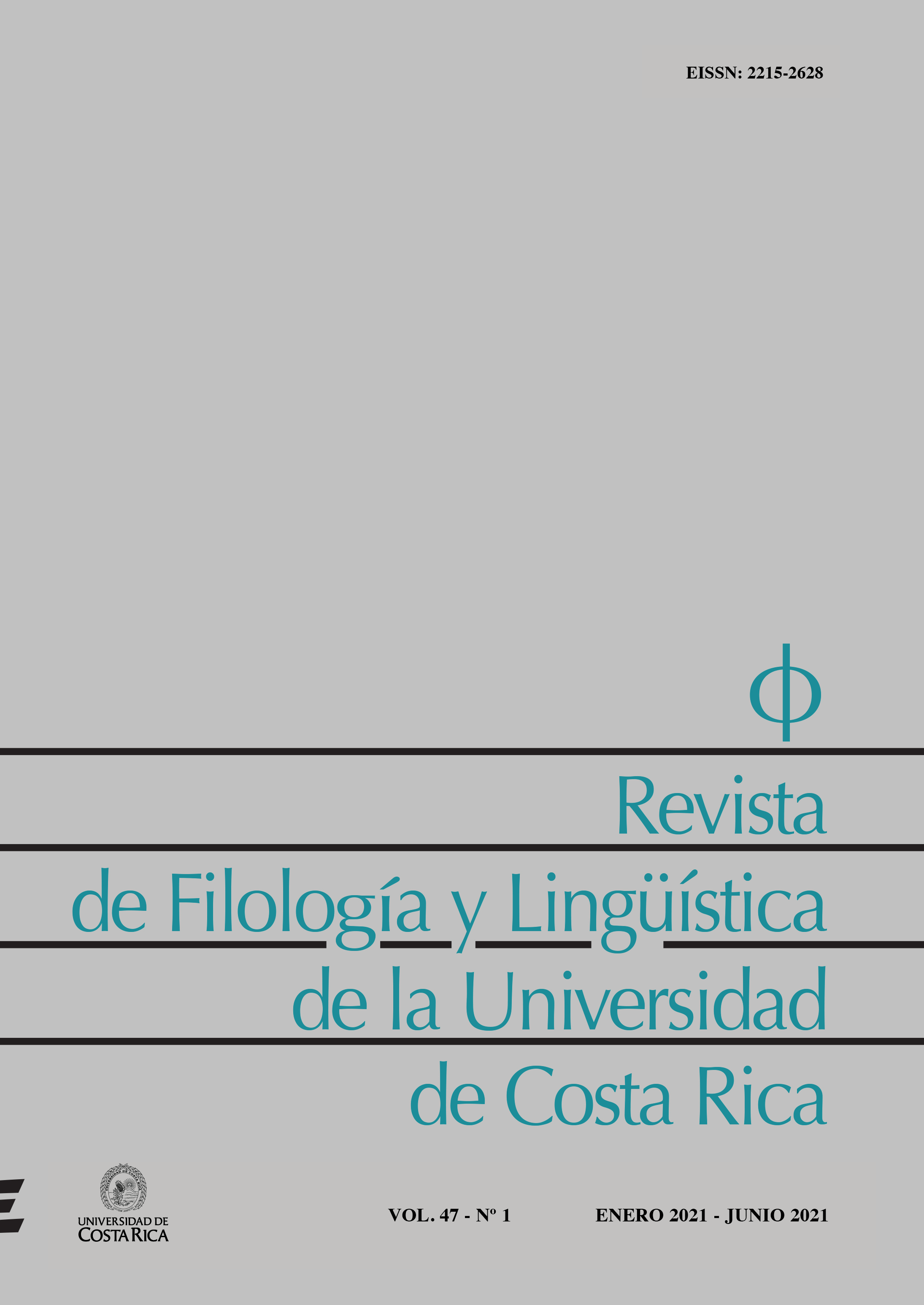Abstract
This article investigates the overlap and porosities between fiction and non-fiction discourses in the early texts of Gabriel García Márquez. I propose there is a fluid process of exchange between informative discourses and those of literary creation, where the young writer experimented to novel within journalism, using hyperbole as well as fictional situations and characters in a phenomenon that I call magical journalism. García Márquez’s use of hyperboles works as a springboard of tensions and intentions to expand and compress semantic content. The writer-journalist constructs hyperboles using two main elements: superfluous detail and precise descriptions. On the one hand, hyperboles overflow, pressing limits and, on the other, intricate detailing controls the excess, rendering images credible in the context of the stories that are told.
References
Abello Banfi, J. (2017). I Don’t Want to Be Remembered for One Hundred Years of Solitude or for the Nobel Prize, But Rather for My Journalism. Review: Literature and Arts of the Americas, 50(2), 178-183.
Arellano, J. (2015). Magical Realism and the History of the Emotions in Latin America. Lewisburg, PA: Bucknell University Press, The Rowman & Littlefield Publishing Group.
Bampiniōtēs, G. (2002). Lexiko tēs neas Hellēnikēs glōssas: Me scholia gia tē sōstē chrēsē tōn lexeōn: hermeneutiko, etymologiko, orthographiko, synōnymōn-antithetōn, kyriōn onomatōn, epistēmonikōn horōn, akrōnymiōn (2. ekd). Grecia: Kentro Lexikologias.
Bell-Villada, G. H. (2010). García Márquez: The an and his work (2 ed., rev.expanded.). Estados Unidos: University of North Carolina Press.
Blanchot, M. (1991). De Kafka a Kafka. México: Fondo de Cultura Económica.
Calvi, P. (2019). Latin American Adventures in Literary Journalism. Pensilvania: University of Pittsburgh Press.
Camayd-Freixas, E. (1998). Realismo mágico y primitivismo: Relecturas de Carpentier, Asturias, Rulfo y García Márquez. Maryland: University Press of America.
Casal, J. del. (1963). Crónicas habaneras. Cuba: Dirección de Publicaciones, Universidad Cental de Las Villas.
Claridge, C. (2011). Hyperbole in English: A Corpus-Based Study of Exaggeration. Cambridge: Cambridge University Press.
Corominas, J. (1991). Diccionario crítico etimológico castellano e hispánico. España: Gredos.
Dorfman, A. (1991). Someone Writes to the Future. Transition, 52, 18-34.
Ducrot, O. y Todorov, T. (1974). Diccionario enciclopédico de las ciencias del lenguaje. Argentina: Siglo Veintiuno Editores.
Flores Sierra, C. (1989). García Márquez, Grupo de Barranquilla, Grupo de Cartagena: Fábula y enigma. Bogotá: Ediciones Luna Hiena.
Gallagher, C. (2006). The Rise of Fictionality. En F. Moretti (Ed.), The Novel (Vol. 1, pp. 336-363). Nueva Jersey: Princeton University Press.
García Márquez, G. (1966). La mala hora. México: Ediciones Era.
García Márquez, G. (1991a). Notas de prensa, 1980-1984. Madrid: Mondadori.
García Márquez, G. (1991b). Textos costeños (J. Gilard, Ed.). España: Mondadori
García Márquez, G. (1994a). Del amor y otros demonios. Colombia: Grupo Editorial Norma.
García Márquez, G. (1994b). Prólogo. En J. F. Fuenmayor, La muerte en la calle (pp. 11-13). Buenos Aires: Santillana.
García Márquez, G. (2002). Vivir para contarla. Madrid: Mondadori.
García Usta, J. (2007). García Márquez en Cartagena: Sus inicios literarios. Bogotá: Editorial Planeta Colombiana.
González Echevarría, R. (1984). Cien años de soledad: The Novel as Myth and Archive. MLN, 99(2), 358-380.
Goodman, N. (1978). Ways of Worldmaking. Indiana: Hackett Pub. Co.
Guillén, C. (2007). Algunas literariedades de Cien años de soledad. En Cien años de soledad (pp. xcvii-cxxvi). Madrid: Alfaguara; Real Academia Española; Asociación de Academias de la Lengua Española.
Harss, L. (1966). Los nuestros. Buenos Aires: Editorial Sudamericana.
Llacer Lorca, E. V. (2001). Historia novelada o novela histórica: El general Bolívar en el laberinto de García Márquez. Revista Hispánica Moderna, 54(2), 427-436.
Mahieux, V. (2011). Urban Chroniclers in Modern Latin America: The Shared Intimacy of Everyday Life. University of Texas Press.
Martin, G. (2009). Gabriel García Márquez, una vida. Barcelona: Debate.
Martin, G. (2012). The Cambridge Introduction to Gabriel García Márquez. Cambridge: Cambridge University Press; eBook Collection (EBSCOhost). Recuperado de http://search.ebscohost.com/login.aspx?direct=true&db=nlebk&AN=451661&authtype=shib&site=eds-live&scope=site&custid=s9008655
Mendoza, P. A. (1982). El olor de la guayaba: Conversaciones con Plinio Apuleyo Mendoza. (1 ed.). España: Bruguera.
Moliner, M. (2007). Diccionario de uso del español. (3ed.). España: Gredos.
Rabassa, G. (1982). García Márquez’s New Book: Literature or Journalism? World Literature Today, 56(1), 48-51.
Ramos, J. (1989). Desencuentros de la modernidad en América Latina: Literatura y política en el siglo XIX. México: Fondo de Cultura Económica.
Real Academia Española. (2020). Desvirtuar. En «Diccionario de la lengua española»—Edición del Tricentenario. Recuperado de https://dle.rae.es/desvirtuar
Real Academia Española. (2019a). Ocurrencia. En «Diccionario de la lengua española»—Edición del Tricentenario. Recuperado de https://dle.rae.es/ocurrencia
Real Academia Española. (2019b). Mentira. En «Diccionario de la lengua española»—Edición del Tricentenario. Recuperado de https://dle.rae.es/mentira
Real Academia Española. (2019c). Resorte. En «Diccionario de la lengua española»—Edición del Tricentenario. Recuperado de https://dle.rae.es/resorte
Rotker, S. (1992). La invención de la crónica. Argentina: Ediciones Letra Buena.
Rueda, M. H. (2017). One Hundred Years of Solitude: From Colombia to the World and Back. Review: Literature and Arts of the Americas, 50(2), 170-177.
Samper, D. (1980). A mí que me esculquen. Barcelona: Editorial Pluma.
Sims, R. L. (2010). García Márquez’s Non-Fiction Works. En Cambridge Companion to Gabriel García Márquez (pp. 144-158). Cambridge: Cambridge University Press.
Sims, R. L. (2016). Felt History and Permutations of the Fictional, Real, and Autobiographical «I» in Gabriel García Márquez’s Chronicle of a Death Foretold and Living to Tell the Tale. En Gabriel García Márquez in Retrospect: A Collection (pp. 197-211). Estados Unidos: Lexington Books.
Sorela, P. (1988). El otro García Márquez: Los años difíciles. España: Mondadori.
Swanson, P. (2017). Pop Goes the Boom: One Hundred Years of Solitude and the Latin American New Novel. Review: Literature and Arts of the Americas, 50(2), 162-169.
Vargas, G. (1985). Sobre literatura colombiana. Colombia: Fundación Simón y Lola Guberek.
Williams, R. L. (1984). Gabriel García Márquez. Woodbridge: Twayne Publishers.
Williams, R. L. (1985). An Introduction to the Early Journalism of Garcia Marquez: 1948-1958. Latin American Literary Review, 13(25), 117-132.

